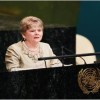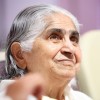Humberto Maturana is first and foremost a reflective man, an original thinker, and a compassionate friend. He is a professor of biology at the University of Chile in Santiago and founder and director of the Laboratory for Experimental Epistemology and the Biology of Cognition. Maturana has achieved international renown as a neurobiologist and is a leading exponent of modern systems thinking. He is the author of several books, including the international bestseller The Tree of Knowledge, written with Francisco Varela.
One subject on which he has written and spoken widely is “The Biology of Love.” He believes that in the subject of greatness, as in the subject of life itself, understanding comes back to the subject of love.
“Love occurs when one behaves in a way such that those around you arise as ‘legitimate others’ in coexistence with you. In our daily life we say that we feel loved when we are in a relation, in which there are no expectations or demands placed upon us, so that we do not have to justify our presence. Love does not expect retribution. The other can appear as he or she is, without pretending to be what he or she is not. Love is a biological, relational disposition and does not need philosophical or religious justification for being there.
“Love is fundamental feature of our biology. A person who one might be willing to say is ‘beyond greatness’ is someone who is open to letting others be – someone who is able to listen and see and let the other be, in such a way that his actions do not constitute a demand for him to deny his history or the natural flow of his living.
“There is a nun who has this place where she collects children. She is supported by the church, because she is a nun of this church. She offers the children the possibility to be themselves and does not demand anything of them, but provides a culture in which their own history can be preserved and where they can grow into self-respecting adults. She doesn’t do this as a way to grow the orphanage or for the purpose of indoctrination. I don’t remember the name of the nun, but I remember that when she was asked if she attempted to convert the children to Roman Catholicism, she answered, ‘No, they have their own histories and beliefs. I just give them love.’
“To see, you must let the other be and not put your expectations or purpose on them. Because if you put expectations on them and your expectations are not satisfied, you are disappointed. They you will not see the other. All you will see is your unmet expectations. When I see with the attitude of ‘let it be,’ without my expectations or desires, then seeing and loving are the same thing. You don’t really see if you don’t love. To love is to let it be.”
(Excerpted from “Something Beyond Greatness – Conversations with a Man of Science & a Woman of God” by Judy Rodgers and Gayatri Naraine, Health Communications, Inc – www.hcibooks.com)





